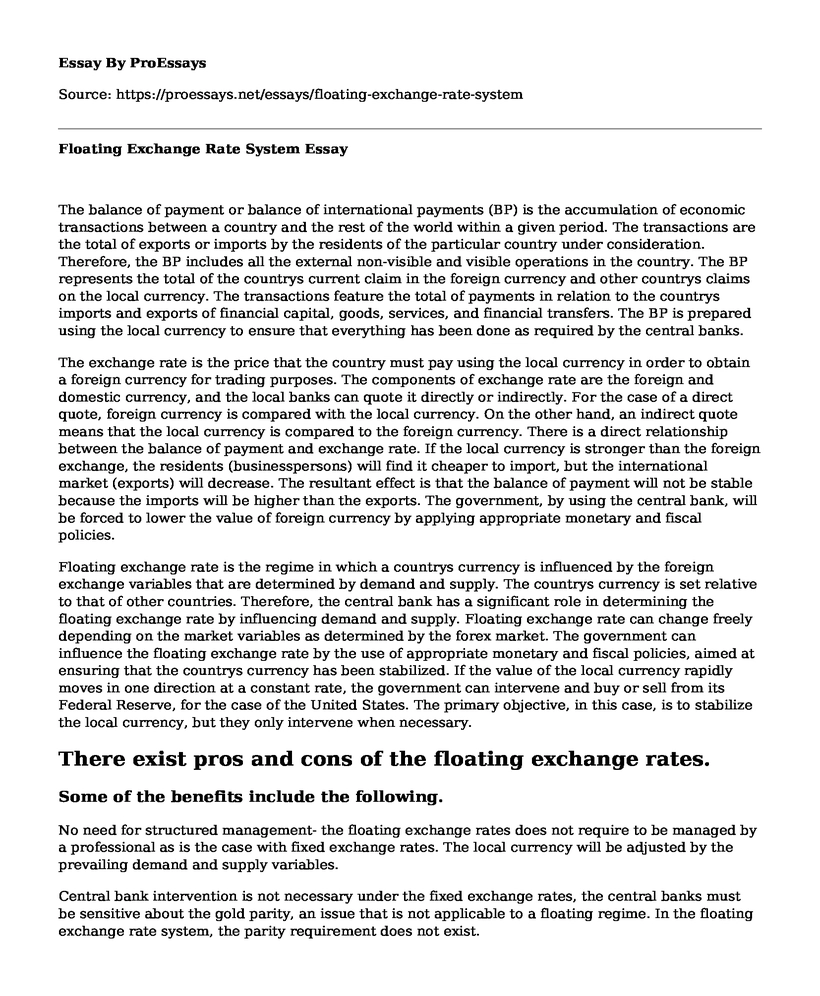The balance of payment or balance of international payments (BP) is the accumulation of economic transactions between a country and the rest of the world within a given period. The transactions are the total of exports or imports by the residents of the particular country under consideration. Therefore, the BP includes all the external non-visible and visible operations in the country. The BP represents the total of the countrys current claim in the foreign currency and other countrys claims on the local currency. The transactions feature the total of payments in relation to the countrys imports and exports of financial capital, goods, services, and financial transfers. The BP is prepared using the local currency to ensure that everything has been done as required by the central banks.
The exchange rate is the price that the country must pay using the local currency in order to obtain a foreign currency for trading purposes. The components of exchange rate are the foreign and domestic currency, and the local banks can quote it directly or indirectly. For the case of a direct quote, foreign currency is compared with the local currency. On the other hand, an indirect quote means that the local currency is compared to the foreign currency. There is a direct relationship between the balance of payment and exchange rate. If the local currency is stronger than the foreign exchange, the residents (businesspersons) will find it cheaper to import, but the international market (exports) will decrease. The resultant effect is that the balance of payment will not be stable because the imports will be higher than the exports. The government, by using the central bank, will be forced to lower the value of foreign currency by applying appropriate monetary and fiscal policies.
Floating exchange rate is the regime in which a countrys currency is influenced by the foreign exchange variables that are determined by demand and supply. The countrys currency is set relative to that of other countries. Therefore, the central bank has a significant role in determining the floating exchange rate by influencing demand and supply. Floating exchange rate can change freely depending on the market variables as determined by the forex market. The government can influence the floating exchange rate by the use of appropriate monetary and fiscal policies, aimed at ensuring that the countrys currency has been stabilized. If the value of the local currency rapidly moves in one direction at a constant rate, the government can intervene and buy or sell from its Federal Reserve, for the case of the United States. The primary objective, in this case, is to stabilize the local currency, but they only intervene when necessary.
There exist pros and cons of the floating exchange rates.
Some of the benefits include the following.
No need for structured management- the floating exchange rates does not require to be managed by a professional as is the case with fixed exchange rates. The local currency will be adjusted by the prevailing demand and supply variables.
Central bank intervention is not necessary under the fixed exchange rates, the central banks must be sensitive about the gold parity, an issue that is not applicable to a floating regime. In the floating exchange rate system, the parity requirement does not exist.
Disadvantages
The main disadvantage of the floating exchange rate is high volatility. Additionally, it is difficult for the macroeconomic professionals to explain issues of short-run volatility.
The pros of the floating exchange rate show that the system is better than the fixed exchange rate system and should be adopted by various governments across the world.
Cite this page
Floating Exchange Rate System. (2021, Mar 10). Retrieved from https://proessays.net/essays/floating-exchange-rate-system
If you are the original author of this essay and no longer wish to have it published on the ProEssays website, please click below to request its removal:
- Generational Differences Among the Kitchen Employees of the Marriott in San Francisco Research
- The African Development Bank (AFDB) Overview Paper Example
- UAE Changes in Employment Essay Example
- 46% College Graduates Reap Benefits of Higher Earning and Debt - Research Paper
- Mgmt Morally Liable for Employees' Deaths: Poor Working Conditions - Essay Sample
- Generic and Corporate Strategies of the Bank of America
- Essential Soft Skills for Workplace Success: A Comprehensive Evaluation







